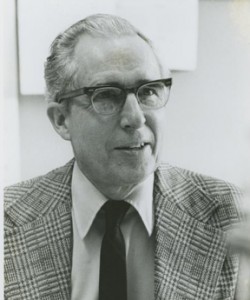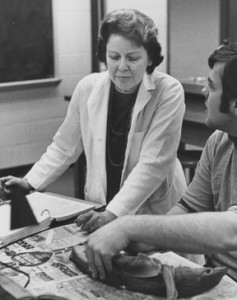At its Nov. 8 meeting, the faculty adopted the following memorial resolution for Donald McCluskey ’36, associate professor emeritus of English, who died Sept. 20, and at its March 6 meeting, the memorial resolution for Mary Jane Bradford, associate professor emerita of biology, who died Nov. 18.

Donald McCluskey '36, courtesy of Digitized Historical Photograph Collection, Lafayette College Archives
Associate Professor Emeritus Donald McCluskey was born in Easton, graduated from Easton High School, and received the A.B. from Lafayette College in 1936. He served overseas during World War II, attaining the rank of Master Sergeant in the U. S. Army Service Forces. After earning the Ph.D. from Yale, he spent his entire professional career on the Lafayette faculty. (He would later tell colleagues that he was hired on the basis of a 30-minute interview with the president.) He was active in the local historical society, the SPCA, and other civic groups. Perhaps no one could have been more firmly rooted in his hometown and his alma mater. To both town and college, however, Professor McCluskey brought a cosmopolitan intellect and spirit. He spoke seven or eight languages, ranging from Russian to Sanskrit. He would have taken it as a matter of course that he had also mastered Old and Middle English. During the summers, he studied at Columbia University, the Linguistic Institute at Georgetown University, and the Breadloaf School at Middlebury College. There he did post-doctoral coursework with scholars of national and international repute. In his early ’90s, he could still recount—and critique—the teaching methods of those experts with precision and wit.
Don was already something of an over-achiever as a Lafayette student: president of his fraternity, active in the Marquis Players, recipient of a prize for study abroad, and a member of the Kirby Government & Law Society and the Maroon Key Club. He clearly excelled in the classroom as well, for the 1936 yearbook attests that his peers were already calling him “Professor.” Intriguingly, however, the yearbook also refers to him as “the raucous roisterer of the ‘Alpha’ and Our Gents Club.”
Years later, his own students would encounter his less raucous side, but they were grateful that he did not try to lord it over them. In 1953, one student called him “[a] really swell person and an excellent teacher. He never gives you a dirty look or an impatient glance when you ask him to repeat something for the third time.” According to another, Professor McCluskey was “a good, kindly, quiet listener, whose scholarship would never loudly and brazenly rear its ugly head.” In 1980—the year of Don’s retirement—a recent Lafayette alumnus responded to a survey conducted by his law school that Professor McCluskey had made “the most notable contribution to his development.”
During most of Don’s years at Lafayette, axiomatically a department had only one professor; as he once said, the rest of the department would “but instruct, assist, associate.” Those duties were heavier than they are now, at least in terms of teaching load. One of his former department heads calculated that from his initial contract in 1946 through his retirement in 1980, Don had “correct[ed] and grad[ed] about 31,196 freshman themes.” (By my calculation, that means at least 450 each semester.) He also taught Chaucer, Shakespeare, the survey of English literature, and the history of the English language—at that time, the core of the department’s curriculum. Nor did Don restrict his teaching to the classroom. His Shakespeare classes spent several Sunday afternoons in Mr. McCluskey’s home, listening to recordings of professional theater productions. He opened his home for meetings of various literary societies as well—and for non-credit evening classes in Sanskrit. Dozens of students are said to have enrolled in those classes, a remarkable testimony to his ability to inspire interest in subjects with no obvious modern relevance.
His hospitality extended to his colleagues and neighbors as well. Many enjoyed his quiet dinner parties and recollections of College history. Some recall having been invited to tea as newcomers to the area and then listening to him play the harp on his porch on summer evenings. He was, write former neighbors, “always so gracious and such a gentleman,” a “kind and gentle man.”
A plaque in Skillman Library’s reference area pays tribute to years of generous support from Donald McCluskey. A further indication of his lifelong dedication to the College was his recognition as a 25+-year member of the Marquis Society. But Don’s loyalty to Lafayette was not unprincipled. Early in his teaching career, a freshman impressed him so highly that Don recommended that his fraternity accept the young man. His recommendation did not succeed. Years later he told a colleague that when he learned the reason—the student was rejected because he was Jewish—he vowed never to set foot in the fraternity again.
Donald McCluskey, admired and loved by generations at Lafayette and beyond, died on Sept. 20, 2011, at the age of 96.
Mr. President, on behalf of the committee, I move that this memorial be filed with the minutes of this meeting and that copies of it be sent to members of Professor McCluskey’s family.
Carolynn Van Dyke, chair, March Professor of English
David Johnson, Professor of English
June Schlueter, Dana Professor Emerita of English
James Woolley, Smith Professor of English
*********

Mary Jane Bradford, courtesy of Digitized Historical Photograph Collection, Lafayette College Archives
Mrs. Mary Jane (Claflin) Bradford, a resident of Whitefield, Maine, formerly of Easton, Pa., and Melrose, Mass., passed away on Friday morning, Nov. 18, 2011, at Winchester Hospital, at age 90.
She was born on Oct. 11, 1921, in Malden, the daughter of the late George Verne Claflin and Laura P. (Goodlin) Claflin. She was raised in Melrose, Mass. and graduated from Melrose High School as valedictorian, Class of 1939. She received her undergraduate degree in biology cum laude from Mount Holyoke College in 1943 and both her M.S. and Ph.D. degrees from University of Wisconsin–Madison in 1945 and 1948, respectively. During the course of her academic studies, she was elected to the Phi Beta Kappa and Sigma Xi honor societies and to membership in the American Academy for the Advancement of Science. Her early research with H.R. Wolfe and C.A. Herrick at Wisconsin led to a series of pioneering studies published in 1946-48 on the application of serum antibodies for neutralizing parasitic infections.
In 1944, she married Robert W. Bradford, beginning a partnership of 67 years. They settled in Easton, where they raised a family of three children. There she was active in the College Hill Presbyterian Church, the League of Women Voters, various community groups, and acted in faculty theater productions at Lafayette College.
In 1960, Mrs. Bradford continued her scientific career, first as an Assistant Professor in Biology and was promoted to Associate Professor of Biology in 1979. Her interests turned from immunology to ecology during her tenure at Lafayette, where she and R.L. Smith published a popular guide to ecology. In 1972 she presented “The Biology of Flowing Water” at the Easton Area Public Library. She was also elected to the presidency of her Phi Beta Kappa and Sigma Xi chapters, and was honored by the College as a Jones Lecturer for her outstanding teaching and scholarly competence in 1975. The title of her Jones Lecture was “The Evolutionary Meaning of Animal Social Organization.”
In 1985, Mr. and Mrs. Bradford retired from college teaching, eager to move to their “Edgeriver Farm” on the banks of the Sheepscot River in Whitefield, Maine, where they intended to breed a flock of Suffolk sheep. Her retirement gift from Lafayette College was an unusual matched set – a Suffolk ewe and a Suffolk ram. For over 25 years, she and Mr. Bradford lived and worked happily on the farm raising a flock of 80 sheep and several cows. Successful in their endeavor, they sold the meat locally and produced enough wool for many warm blankets, sweaters, and mittens.
Continuing her academic work and with an eye toward the ecology of Maine, Miji became actively involved in local conservation efforts. She was a member of the Sheepscot River Watershed Council and the Governor’s Agricultural Council. She loved canoeing, camping and studying the ecology of the surrounding land and streams.
In her spare time, Miji enjoyed watercolor painting, photography, square dancing with Mr. Bradford, membership in a book club, cooking, and braiding rugs. She was an active member of St. Giles’ Episcopal Church, sang in the choir, and loved baking for the annual summer fair. She will be remembered as a great cribbage player and for her love of Claflin family reunions.
Miji is survived by her beloved husband, Robert W. Bradford with whom she shared 67 years of marriage; her daughter, Martha Jane Bradford and her husband Alfred M. Ajami of Brookline, Mass.; her sons, R. Verne Bradford and his wife Martha P. Bradford of Winchester, Mass., and John W. Bradford and his loving companion Laurette A. Crane of Natick, Mass.; her grandchildren, M. Tucker Bradford and his wife Victoria of San Francisco, Calif., and Katherine B. Aleo and her husband Michael of Northampton, Mass.; her great-grandchildren, Ruby E. Bradford, Miles O. Bradford, and Jacob B. Aleo.
Relatives and friends honored and celebrated Miji’s life by gathering for a Memorial Service at the St. Giles’ Episcopal Church, 72 Gardiner Rd., (Route 126), Jefferson, ME 04348, on Saturday, Dec. 3 at 11:00 a.m. Interment was done privately in the Whitefield Cemetery Association, Whitefield, Maine. Gifts to honor Miji’s life may be made to the St. Giles’ Episcopal Church. Arrangements by the Robinson Funeral Home, 809 Main St., Melrose, Mass.
Mr. President, on behalf of the committee, I move that this memorial be filed with the minutes of this meeting and that copies of it be sent to Robert Bradford, her daughter Martha Jane Bradford, and her sons, Verne and John Bradford.
Laurie Caslake, Associate Professor of Biology

